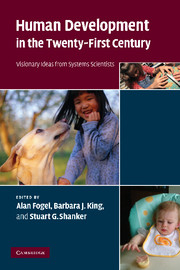Book contents
- Frontmatter
- Contents
- List of contributors
- Introduction: Why a dynamic systems approach to fostering human development?
- Part I Dynamic relationships between genetics and environments
- 1 Developmental dynamics: the new view from the life sciences
- 2 Genes, experience, and behavior
- 3 How dynamic systems have changed our minds
- 4 Individual development as a system of coactions: implications for research and policy
- 5 Gene–environment interactions and inter-individual differences in rhesus monkey behavioral and biological development
- Part II The dynamic system of the child in the family
- Part III The dynamic system of the child in social and physical environment
- Part IV Dynamic systems approaches to mental health
- Part V Conclusions and outlook
- Index
- References
3 - How dynamic systems have changed our minds
Published online by Cambridge University Press: 22 September 2009
- Frontmatter
- Contents
- List of contributors
- Introduction: Why a dynamic systems approach to fostering human development?
- Part I Dynamic relationships between genetics and environments
- 1 Developmental dynamics: the new view from the life sciences
- 2 Genes, experience, and behavior
- 3 How dynamic systems have changed our minds
- 4 Individual development as a system of coactions: implications for research and policy
- 5 Gene–environment interactions and inter-individual differences in rhesus monkey behavioral and biological development
- Part II The dynamic system of the child in the family
- Part III The dynamic system of the child in social and physical environment
- Part IV Dynamic systems approaches to mental health
- Part V Conclusions and outlook
- Index
- References
Summary
Laws of physics tell us that all things tend towards states of randomness or disorder. Yet all around the living world we see well-formed structures of dazzling complexity and diversity. How this form and diversity comes about has puzzled thinkers for centuries. When we turn to consider the human mind, the problems of explanation often seem impossibly complex. The depths and intricacies of our knowledge; the logical structures of thought; the acoustic weave of every spoken utterance; the bright new ideas and imaginings of even a five-year-old; the coherence of human cooperative endeavors; all these often seem far beyond any rational or scientific account.
Some philosophers have often wondered whether there may be something within natural laws themselves that explains the complexity of the world, the complexity of living things, and even the complexity of the human mind. The atomists in Ancient Greece certainly thought so. The philosopher Descartes, in the seventeenth century, mused about the possibility. And Alfred Wallace, co-founder with Darwin of the modern theory of evolution, suspected that the same principles of structure-making that create ice patterns on a frozen window are also responsible for the order in living things. In the absence of conceivable mechanisms, however, the main tendency has been to seek explanations in some fundamental agency of design. As with the most recent candidate, the genes, those explanations have almost always implied a fatalism about human nature, and limited, pessimistic views of human potential.
Information
- Type
- Chapter
- Information
- Human Development in the Twenty-First CenturyVisionary Ideas from Systems Scientists, pp. 25 - 40Publisher: Cambridge University PressPrint publication year: 2007
